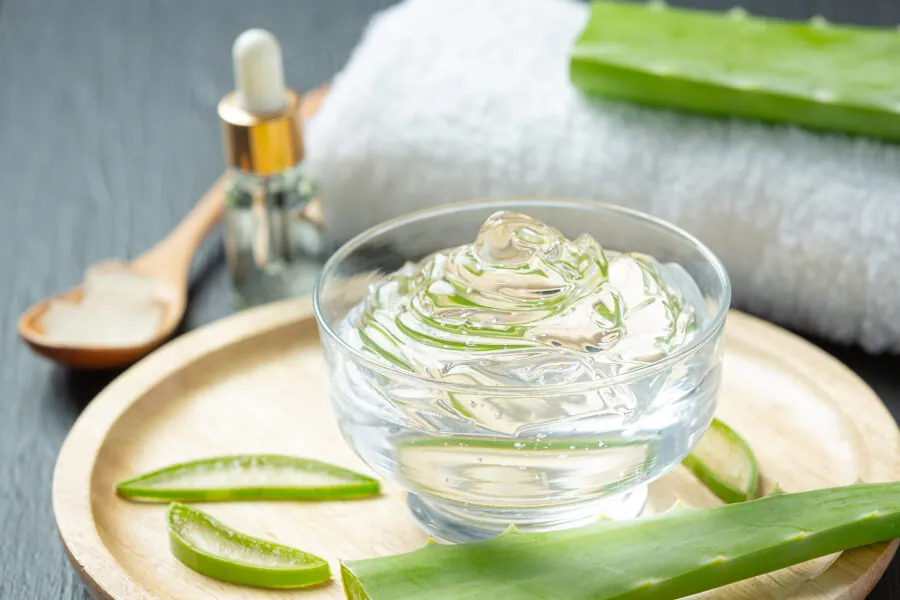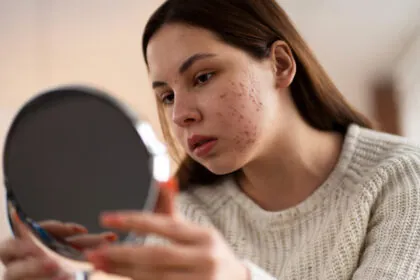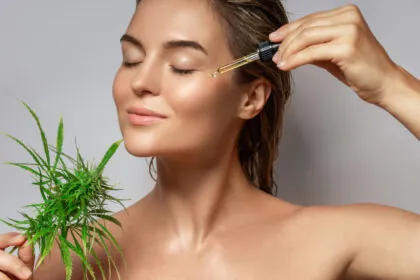Acne is a common skin disease that impacts millions of individuals globally. It can result in redness, swelling, acne, and in rare cases, scarring on the back, chest, face, or other parts of the body.
Acne scars are the result of damage to the skin tissue from the inflammation and infection of acne. They can appear as dark spots, raised bumps, or depressed pits on the skin.
If you are looking for a natural and effective way to treat acne and scars, you may want to consider using aloe vera gel. Aloe vera is a plant that has been used for thousands of years for its healing and soothing properties.
It contains various nutrients, enzymes, antioxidants, and anti-inflammatory agents that can benefit the skin in many ways.
In this blog post, we will explore how aloe vera gel can help you with acne and scars, what types of aloe vera gel to use, how to apply it, and what other treatments you can combine with it. By the end of this post, you will have a better understanding of how aloe vera gel can improve your skin health and appearance.
How Aloe Vera Gel Can Help You With Acne and Scars
This gel can help you with acne and scars in several ways, such as:
Reducing inflammation and redness
This gel has anti-inflammatory properties that can help reduce the swelling, pain, and redness caused by acne. It can also soothe the irritated and inflamed skin and prevent further damage.
A 2009 study published in the International Journal of Natural Therapy found that aloe vera gel can increase the immune system’s response to inflammation and reduce the appearance of acne scarring.
Fighting bacteria and infection
This gel has antibacterial and antiseptic properties that can help prevent and treat the infection of acne. It can also inhibit the growth of acne-causing bacteria, such as
Propionibacterium acnes and Staphylococcus aureus.2014 research that was released in the Journal of Dermatological Treatment found that aloe vera gel combined with tretinoin cream (a topical acne medication) was more effective than tretinoin alone in reducing acne lesions and improving skin quality.
Healing and repairing the skin
This gel can stimulate the production of collagen and elastin, which are essential for skin repair and regeneration. Collagen and elastin are the proteins that give the skin its strength and elasticity.
By increasing the synthesis of these proteins, This can help heal the damaged skin tissue and restore its normal structure. An analysis released in 2016 in the Iranian Journal of Medical Sciences found that the can enhance the wound healing process and reduce scar formation.
Lightening and fading the scars
This gel can help lighten and fade the scars by reducing the overproduction of melanin, which is the pigment that gives the skin its color.
Melanin can accumulate in the scarred areas and make them darker and more noticeable.
The gel contains a compound called aloesin, which can inhibit the enzyme that produces melanin and prevent hyperpigmentation. A 2018 review of studies found that aloesin can help reduce the darkening of acne scars and improve the skin tone.
What Types of Aloe Vera Gel to Use
Aloe vera gels are not all made equally. Some may contain additives, preservatives, colors, or thickeners that can irritate the skin or reduce the effectiveness of the gel.
To get the best results, you should look for aloe vera gels that meet the following criteria:
Pure and natural
The best aloe vera gels are those that contain at least 99% pure aloe vera gel extracted from the inner leaf of the plant.
They should not have any artificial ingredients, such as fragrances, alcohols, parabens, sulfates, or dyes. You can also make your own aloe vera gel by cutting a fresh aloe vera leaf and scooping out the gel from inside. However, homemade aloe vera gel may spoil quickly without refrigeration, so you should use it within a few days.
Organic and certified
The best aloe vera gels are those that are grown organically and certified by reputable organizations, such as the International Aloe Science Council (IASC), the USDA Organic, or the ECOCERT. These certifications ensure that the aloe vera plants are grown without the use of pesticides, herbicides, or chemical fertilizers, and that the gel is processed and tested for quality and purity.
Stabilized and preserved
The best aloe vera gels are those that are stabilized and preserved with natural and safe ingredients, such as vitamin C, vitamin E, citric acid, or potassium sorbate. These ingredients help prevent the oxidation and degradation of the gel, and extend its shelf life and potency.
They also provide additional benefits for the skin, such as antioxidant and moisturizing effects.
Some examples of dermatologist-recommended aloe vera gels that meet these criteria are:
WOW Aloe Vera Gel
This is a 99% pure aloe vera gel with xanthan gum as a thickening agent, and potassium sorbate as a preservative. It is packaged in a tinted flip-open bottle that protects the gel from air and sunlight exposure. It is certified by the IASC and the USDA Organic.
Mamaearth Aloe Vera Gel
This is a 99% pure aloe vera gel with xanthan gum as a thickening agent, and potassium sorbate as a preservative. It also contains glycerin, vitamin E, allantoin, and sodium PCA as hydrating and soothing ingredients. It is packaged in a pump bottle that protects the gel from air exposure. It is certified by the ECOCERT and the Made Safe.
Seven Minerals Aloe Vera Gel
This is a 99.75% pure aloe vera gel with seaweed as a thickening agent, and citric acid and ascorbic acid as preservatives. It also contains organic chamomile and organic calendula extracts as anti-inflammatory and healing ingredients. It is packaged in a BPA-free bottle that protects the gel from air and sunlight exposure. It is certified by the IASC and the USDA Organic.
How to Apply Aloe Vera Gel
To use aloe vera gel for acne and scars, you can follow these simple steps:
Cleanse your skin
Wash your face with a gentle cleanser and warm (not too hot) water. Pat your skin dry with a soft towel. Avoid rubbing or scrubbing your skin, as this can irritate it and worsen the acne and scars.
Apply the aloe vera gel
Apply a thin layer of aloe vera gel to the affected areas of your skin. You can use your fingers or a cotton pad to spread the gel evenly. Massage the gel gently into your skin until it is fully absorbed. Avoid getting the gel into your eyes, nose, or mouth.
Repeat the application
You can apply the aloe vera gel twice a day, in the morning and at night, after cleansing your skin. You can also apply it more often if your skin feels dry or irritated. You can leave the gel on your skin overnight, or wash it off after 15 to 20 minutes if you prefer.
Monitor your skin’s reaction. Aloe vera gel is generally safe and well-tolerated by most people, but some may experience allergic reactions or sensitivity to it. If you notice any signs of irritation, such as itching, burning, redness, or rash, stop using the gel and consult your doctor.
You can also do a patch test before using the gel, by applying a small amount of it to a discreet area of your skin and waiting for 24 hours to see if any reaction occurs.
What Other Treatments You Can Combine With Aloe Vera Gel
Aloe vera gel can be used alone or in combination with other treatments to enhance its effects on acne and scars. Some of the treatments you can combine with aloe vera gel are:
Witch hazel
Witch hazel is a natural astringent and anti-inflammatory agent that can help reduce the excess oil, bacteria, and inflammation that cause acne. It can also help tighten the pores and improve the skin texture. You can mix a few drops of witch hazel with aloe vera gel and apply it to your skin as a toner or a mask. You can also use a cotton pad soaked in witch hazel to wipe your skin after cleansing and before applying the aloe vera gel.
Tea tree oil
Tea tree oil is a natural antiseptic and anti-inflammatory agent that can help kill the acne-causing bacteria and reduce the inflammation and swelling of the pimples. It can also help heal the acne lesions and prevent scarring.
You can mix a few drops of tea tree oil with aloe vera gel and apply it to your skin as a spot treatment or a mask. You can also add a few drops of tea tree oil to your cleanser or moisturizer and use them as usual.
Honey
Honey is a natural humectant and antibacterial agent that can help moisturize, nourish, and protect the skin. It can also help heal the acne wounds and lighten the scars. You can mix a teaspoon of honey with aloe vera gel and apply it to your skin as a mask.
Conclusion
In conclusion, the gel stands as a powerful natural remedy for treating acne and scars. Its anti-inflammatory, antimicrobial, and wound-healing properties make it an effective solution for soothing irritated skin, reducing acne breakouts, and minimizing the appearance of scars.
Whether applied topically or ingested, the gel offers a gentle and versatile treatment option suitable for all skin types.
By incorporating the gel into your skincare routine, you can harness its healing benefits to achieve clearer, smoother, and healthier-looking skin.
FAQs
How often should I apply aloe vera gel to treat acne?
For best results, apply a thin layer of the gel to clean, dry skin twice daily, once in the morning and once before bedtime.
Can aloe vera gel help fade old acne scars?
Yes, This gel contains compounds that promote skin regeneration and repair, which can gradually fade the appearance of old acne scars over time with consistent use.
Is it safe to use aloe vera gel on sensitive skin?
Yes, This gel is generally safe for sensitive skin, as it is soothing and gentle. However, it’s always advisable to perform a patch test before applying it to a larger area to ensure compatibility.
Can I leave aloe vera gel on my face overnight?
Yes, you can leave aloe vera gel on your face overnight as a soothing overnight treatment. However, if you experience any irritation or discomfort, rinse it off immediately.
Can aloe vera gel be used as a moisturizer?
Yes, aloe vera gel can serve as a lightweight moisturizer, particularly for oily or acne-prone skin, as it hydrates without clogging pores.
Are there any potential side effects of using aloe vera gel?
While rare, some individuals may experience allergic reactions or skin irritation from aloevera gel. If you notice any adverse reactions, discontinue use and consult a dermatologist.
Additionally, if ingesting the gel, be cautious of potential gastrointestinal discomfort and consult a healthcare professional if needed.





